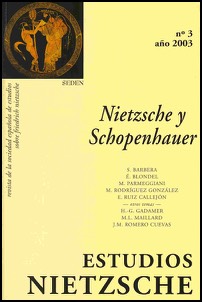El Nietzsche de Zambrano
DOI:
https://doi.org/10.24310/EstudiosNIETen.vi3.9114Abstract
La filosofía de María Zambrano mantiene un diálogo ininterrumpido con Nietzsche, es decir, con el nihilismo contemporáneo. La comprensión de la vida como continua transformación, es una idea que ambos filósofos comparten, así como el amor, la pasión por el hombre; pero les van a separar una diferente concepción del tiempo y una diferente comprensión de lo sagrado. Seducido por lo divino, Nietzsche no supo descubrir el fondo del que surge lo divino, lo sagrado. Éste se basa en el tiempo y el tiempo es la resistencia implacable que la vida opone al delirio de deificación.
Downloads
Metrics
References
Campos Daroca, J., «De Zambrano a Nietzsche. Soledad, liberación y magisterio político», Metapolítica, 4/16, 2001, 54-65.
Nietzsche, F., Fragmentos Póstumos I-IV (FP). Director ed. Diego Sánchez Meca. Madrid: Tecnos, 2006-2010.
Nietzsche, F., Obras Completas, I-IV (OC ). Director ed. Diego Sánchez Meca. Madrid: Tecnos, 2011-2016
Quesada, J., «La crítica de la metafísica...», Archipiélago, 40, febrero-marzo 2000.
Safranski, R., Nietzsche, Tusquets, Barcelona, 2001.
Savater, F., «Un intelectual de segunda generación», Archipiélago, 40, febrero-marzo 2000.
Zambrano, M., «La destrucción de la filosofía en Nietzsche», en Hacia un saber sobre el alma, Alianza, Madrid, 1989, 136.
Zambrano, M., De la Aurora, Turner, Madrid, 1986, p. 125.
Zambrano, M., El hombre y lo divino, FCE, México, 1955, p. 153.
Zambrano, M., El sueño creador, Turner, Madrid, 1986, p. 61.
Zambrano, M., «Carta abierta a Alfonso Reyes sobre Goethe», en La razón en la sombra. Antología del pensamiento de María Zambrano, ed. J. Moreno, Siruela, Madrid, 1993.
Zambrano, M., «Lou Andreas Salomé: Nietzsche», en Hacia un saber sobre el alma, Alianza, Madrid, 1989.
Zambrano, M., Filosofía y Poesía, FCE, México, 1987, pp. 95-96.
Zambrano, M., La confesión: género literario, FCE, México, 1988, p. 11.
Downloads
Published
How to Cite
Issue
Section
License
As of issue 21 (2021) this journal is published only in open access (diamond route).
From that number 21, like the previous numbers published in NIETZSCHE STUDIES, they are subject to the Creative Commons Acknowledgment-NoComercia-ShareIgual 4.0 license, the full text of which can be consulted at <http://creativecommons.org/licenses/by-nc-sa/4.0 >
It is the responsibility of the authors to obtain the necessary permissions of the images that are subject to copyright.
This work is licensed under a Creative Commons Attribution-NonCommercial-ShareAlike 4.0 International License.
Copyright generates two different rights: moral rights and patrimonial rights that EJFB recognizes and respects. Moral rights are those relating to the recognition of the authorship. They are rights of a personal nature that are perpetual, inalienable, unseizable and imprescriptible as consequence of the indivisible union of the author and his/her work.
Patrimonial rights are those that can be derived from the reproduction, distribution, adaptation or communication of the work, among others.







11.png)
